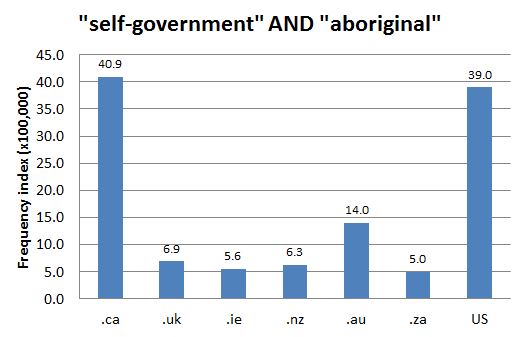DCHP-2
self-government DCHP-2 (July 2016)
n. — Aboriginal, especially First Nations
the right of Aboriginal peoples to govern their own political, cultural, economic and territorial affairs.
Type: 4. Culturally Significant — The term self-government refers to the inherent right of Aboriginal peoples to govern their internal affairs (see Parliament of Canada reference). Self-government agreements between the federal government and Aboriginal nations provide Aboriginal groups with more autonomy in regards to "...governance, social and economic development, education, health, lands and more" (see the 2013 quotation). However, some of these agreements are viewed as a simple download of Federal responsibilities rather than a full engagement with First Nations' rights to self-government and self-determination. Many Aboriginal peoples consider self-government a pre-existing right and responsibility that was granted to them by the/a "Creator", who "placed each nation on its own land and gave the people the responsibility of caring for the land - and one another - until the end of time" (see first AANDC reference). The rights to self-government are protected and affirmed both nationally and internationally; both Section 35 of the Canadian Constitution Act (1982) and the United Nations Universal Declaration of Human Rights (1948) recognize this inherent right, although it has been noted as "incremental[ly] judicial" for its case-to-case nature (see Canadian Encyclopedia, s.v. "Self-Government: Indigenous Peoples").
The term self-government is seen as an expression of "self-determination" (see the 1977 quotation), an internationally recognized right that can be used to support self-government efforts (see self-determination). Due to the variety of needs possessed by Aboriginal groups, communities and regions, there is no single model of self-government (see the 2012 quotation), as each First Nation establishes their own system (see BC Treaty Commission reference). Despite this variety, basic models have been identified, including Nation government, Public government and Community of Interest government (see second AANDC reference).
This right has been legally suppressed throughout the process of European occupation and imposition of Euro-Canadian political ideals (see Parliament of Canada reference). For example, the Indian Act of 1876 "removed" traditional systems of governance (see Canadian Encyclopedia reference). In 1996, a constitutional recognition of the right to self-government was proposed by the Royal Commission on Aboriginal Peoples as a valuable contribution to improving the relationship between Aboriginal peoples and the Canadian government. While there have been some political negotiations between the government and the First Nations and Inuit peoples, the Metis and other Aboriginal peoples who do not live in Aboriginal communities have yet to receive any sort of entitlement to self-government (see Canadian Encyclopedia reference).
The United Nations has noted Canada's limited progress in recognizing Aboriginal peoples' rights of self-determination, and thus self-government (see Canadian Encyclopedia reference).
Chart 1 shows that self-government is most frequent in Canada, with the US behind by a narrow margin.See also: Indian Act download self-determination sovereignty (meaning 2) three orders of government (meaning 2)
References:
- AANDC "ARCHIVED - Highlights from the Report of the Royal Commission on Aboriginal Peoples " Accessed 8 May 2014
- AANDC "Fact Sheet: Aboriginal Self-Government " Accessed 8 May 2014
- BC Treaty Commission "Self-Government" Accessed 8 May 2014
- Canadian Encyclopedia "Self-Government: Indigenous Peoples Accessed 10 Jul. 2016
- Parliament of Canada "Aboriginal Self-Government Accessed 8 May 2014
Images:
Chart 1: Internet Domain Search, 7 May 2014
